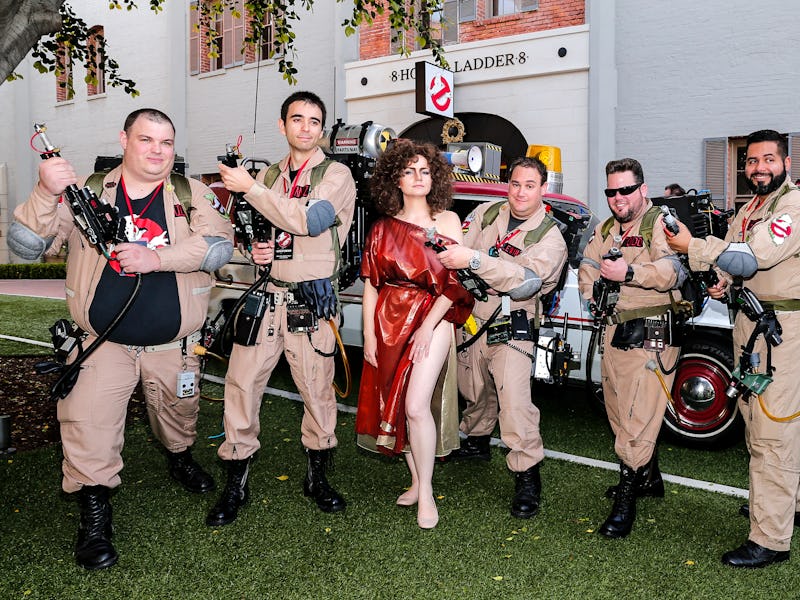How 'Ghostbusters' is Fighting — and Fighting to Win Over — Petulant Man-Babies
Unfortunately, they gotta call in the big guns to win over the misogynists.

With less than a month before the Ghostbusters reboot hits theaters, Sony is on the offensive. After two years of annoying controversy, the company is taking a very comprehensive approach to dealing with the mindless misogynists who have bedeviled the all-female twist on the ‘80s comedy franchise. It’s a carrot-and-stick plan, and one indicative of the power of the beast the studio trying to tame.
Most publicly, the Ghostbusters team is shaming the nitwits who have tarred the movie’s YouTube account and sent nasty messages to its cast. However, the studio still needs those people to buy tickets, which complicates matters . So, Sony has, also recently undergone a new phase of their Ghostbuster publicity rollout: extravagant marketing campaigns meant to appeal directly to their wounded manhoods and inner children.
Director Paul Feig has been the leading spokesperson for the hater-shaming campaign. Feig, Hollywood’s go-to male shepherd of female comedy since 2011’s Bridesmaids, has spent months swiping protectively at the man children of the ‘80s who have hurled insults at his cast and down voted the film’s YouTube trailer in record numbers. Recently, he called the comments received by his film’s stars (including the beloved Melissa McCarthy and Kristen Wiig) “some of the most vile, misogynistic shit I’ve ever seen in my life.”
The public shaming, that’s the stick, though from the looks of the video below, it may not carry all that much sting.
As much as Feig and co. would probably like to banish the 30-something fanboy offenders back to their He-Man playset in hell, the fact is that they need their money (if not full-on enthusiasm) for the movie to be as big a hit as Sony needs it to be. The most desired movie demographic is still men 18-34, after all. And so comes the carrot, fed subliminally through a mix of targeted advertising and turning the nostalgia game back in their favor.
The first and most obvious part of the strategy is to get the original Ghostbusters on board. That’s not all that hard; original writer/producer/star Dan Aykroyd is an executive producer on this new iteration (and reportedly makes a cameo), and he’s already said that the reboot is better than the original.
Aykroyd and his surviving original co-stars — including Bill Murray, who also cameos in the new film after years of dragging his heels — appeared on Jimmy Kimmel Live alongside the new cast. It was an implied passing of the torch ceremony, with the old fan favorites offering up their approval for the new generation of Ghostbusters. If their heroes promise that these new stars won’t ruin their precious childhoods, maybe there really is nothing to fear from delightful women dressing up as a slapstick troupe of supernatural pest control workers.
Sony’s not just looking to assuage the irrational fears of the petulant subgroup of internet nimrods; the company is also trying to appeal to the casual fan who, even if he hasn’t paid much attention to the manufactured controversy, just isn’t sold on watching women in an action film.
It’s generally hard to reach a mass audience these days, especially in the segmented 18-34 male demo, but the big-time NBA Finals has provided the perfect platform for such a crucial endeavor. And Sony is going all-in, sparing no expense to enlist another kind of dude hero in the effort.
Over the last week, Sony has been running ads that feature several NBA stars — including Kobe Bryant and several New York Knicks — joining up with the Ghostbusters. Spike Lee, who had no involvement in the making of the film, is in the Knicks commercial, naturally. The NBA really has nothing to do with Ghostbusters, and doesn’t even have a broadcast deal with Sony, but its players are major influencers, both at home and abroad, so it’s worth a shot.
It feels a little counter-intuitive, to advertise an all-female team by running advertisements featuring gigantic men joining the squad in clips that don’t feature any women. But again, it’s the implicit approval from these male heroes that’s most important to the target audience.
Assuming no one goes into the movie expecting Carmelo Anthony to strap on a proton pack and fight ghosts, the campaign probably can’t hurt. In the bigger picture, though, it’s depressing that Hollywood now has to chase and console such a large demographic as a result of spending so many years catering to its every wish.